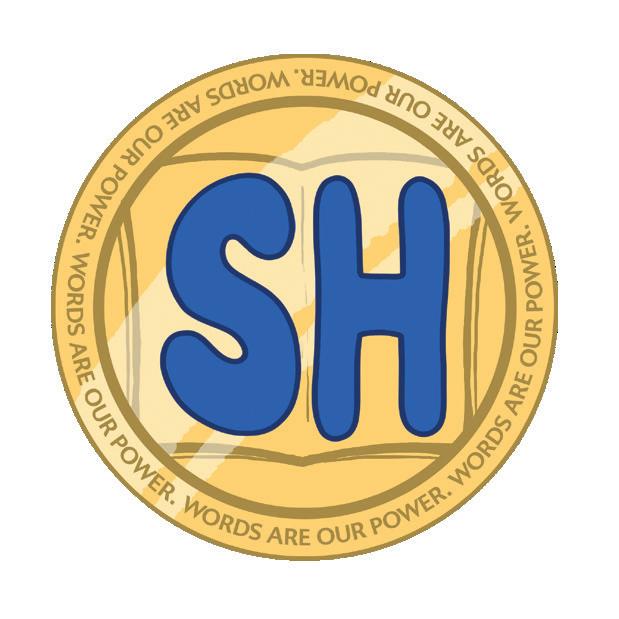(Awaiting Title)








 Prepared by Dr Steph Hawke, Head of Learning and Impact at Curious Minds
Prepared by Dr Steph Hawke, Head of Learning and Impact at Curious Minds
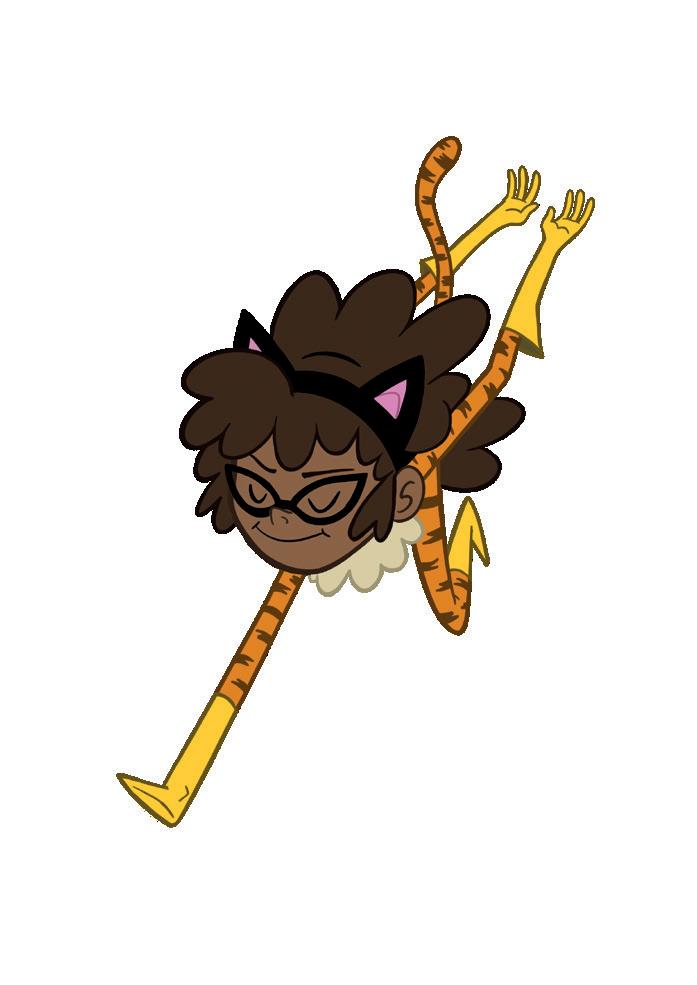
Super Heroes is a pioneering four-year project (2019-2022) that aimed to place a professional writer in residence in 8 primary schools to work across Key Stage 2. Exploring a range of creative writing strategies, children were encouraged to use their imaginations. Poets, authors, comic book writers, spoken word artists and playwrights, worked alongside teachers, supporting them to put creativity back into the curriculum.
Writing on the Wall believe that creativity can be transformational. The above quote from a teacher is in many ways justification enough for the Super Heroes: Words Are Our Power Project. However, the achievements of the project go much further and deeper. Its impact upon pupils, staff, and the whole school outlined in this independent evaluation report prepared by Dr Steph Hawke, Head of Learning and Impact at Curious Minds, who provide strategic support to the cultural education sector, all evidenced with robust monitoring and feedback, are the reasons why we are so proud to present this report to you and to celebrate the incredible work of our staff, writers, artists, volunteers, and teachers, and of course, the pupils who we have worked with over the past four years. They are also a reason to look ahead with confidence towards what we can now achieve as we seek to build upon our work, our learning and our partnerships with schools, to continue to use creativity to inspire, engage and transform the lives of young people.
Super Heroes: Words Are Our Power began with a ‘Test and Explore’ grant from The Paul Hamlyn Foundation, allowing Writing on the Wall to deliver a five-week creative writing programme in twenty-five schools over two years. A key aspect of the feedback from the original project was that both the schools and Writing on the Wall felt that pupils would benefit from a long-term, consistent intervention. Based upon our feedback and evaluation from this period, we applied for and were granted ‘More and Better’ funding from the Paul Hamlyn Foundation, to develop the project by working with eight schools over four years. Our aim was to test the impact upon pupils and staff of this long-term consistent intervention, and to develop our learning as to how best Writing on the Wall as an independent arts organisation
could collaborate with schools to offer our skills and networks of artists and writers to support pupils and staff through creativity.
Writing on the wall are interested in where, why and how change takes place for schools and pupils, and how they interact with each other – what are the moments of change, what comes before, what comes after, and what are the other events/issues/interventions that interact to create or initiate moments of change.
The four-year delivery period gave us the opportunity to conduct a longitudinal evaluation to monitor the individual school approaches to the work, live interactions and learning between pupils, artists and writers, teaching methods and resources used, and assess the impact on schools and pupils, in ways beyond that of our previous short-term projects.
It contributed to our understanding of the learning processes and behaviours of young people, and how to create, deliver and evaluate a long-term programme of support based around the use of creativity within schools; writing specifically, but also using other artistic forms, including illustration and spoken word.
Alongside testing out these approaches, we were also exploring how best an arts organisation could work alongside schools, throughout each term, with all the challenges faced by schools, to support them to achieve their aims, and to share with them our knowledge, expertise, networks and creativity.
We hope the schools feel as we do that we have proven, given the time and funding, clear partnership agreements, a shared commitment and willingness to be flexible, that pairing arts organisations with schools can have major benefits for everyone, not least of all the pupils at the centre of the work.
“We’ve never seen children write like this before!”
Back in 2018 we got the call from Writing on the Wall looking for our help
The Writing on the Wall team worked with Curious minds to develop a Theory of Change for the project. Theory of change is a model that defines the goals of a project and the steps taken to achieve them.
primary schools in liverpool had found a gap in their curriculum
• Place professional writers and Writing on the Wall team in schools for a full term each year.
• Commission wide diversity of poets, authors, comic book writers, spoken word artists and playwrights to work in the classroom.
• Focus on creativity and writing for pleasure.
• Start with children’s own identities, interests and experiences.
• Provide CPD for teachers and model creative approaches to teaching and learning.
Teachers and children wanTed more diverse creativity in school, and we had the exciting opporTunity to expand our super hero squad




We knew exacTly how powerful creative education can be, and so alongside WoW we created the super heroes: Words are our power projecT!
• Writers in residence across 8 schools over 4 years.
• Published anthologies of children’s writing.
• Published Diverse Stories for a Diverse World.
• Teaching resources.
• CPD sessions with guest facilitators.
• There is a sustained relationship between children, art and culture.
• Children have met writers and role models and are inspired.
• Children are more engaged as learners.
• Children and teachers have developed their confidence to be creative.
• Authors have shared their skills as facilitators and writers.
• Arts-based learning is more embedded in the wider school culture.
• Increased recognition and understanding of importance of diversity in children’s literature.
• Children’s aspirations are raised.
• Children are more confident and creative as learners and as individuals.
• Teachers and schools are more committed to creativity in education.
• Schools are actively addressing diversity and representation.
The pandemic interrupted Super Heroes in 2020. Covid hit after just two terms of delivery in schools. School closures were followed by infection control measures and writers and facilitators could no longer go into classrooms.

Writers in residence were a key ingredient when planning how Super Heroes could meet its goal of embedding creativity in schools. The plan was built on assumptions that teachers and writers would build relationships over time, and that children would meet creative adults and enjoy learning.

These vital experiences were the mechanisms by which the project goals would be achieved over the four years. Covid control measures completely changed the experience of Super Heroes for everyone involved.
The team had to think quickly. Super Heroes pivoted towards new approaches, shifting to remote and online delivery and piloting innovative video content.
Diverse Stories for a Diverse World Resource Pack Playground Poems
Anthology of illustrated stories by 13 Liverpool writers.
Teaching resources to accompany each of the Diverse Stories created by 10 writers.
Anthology of children’s poetry from 8 schools.
Zoom Sessions Pre Recorded Video Lessons Playground Launch Events
Writers teaching classes live online.
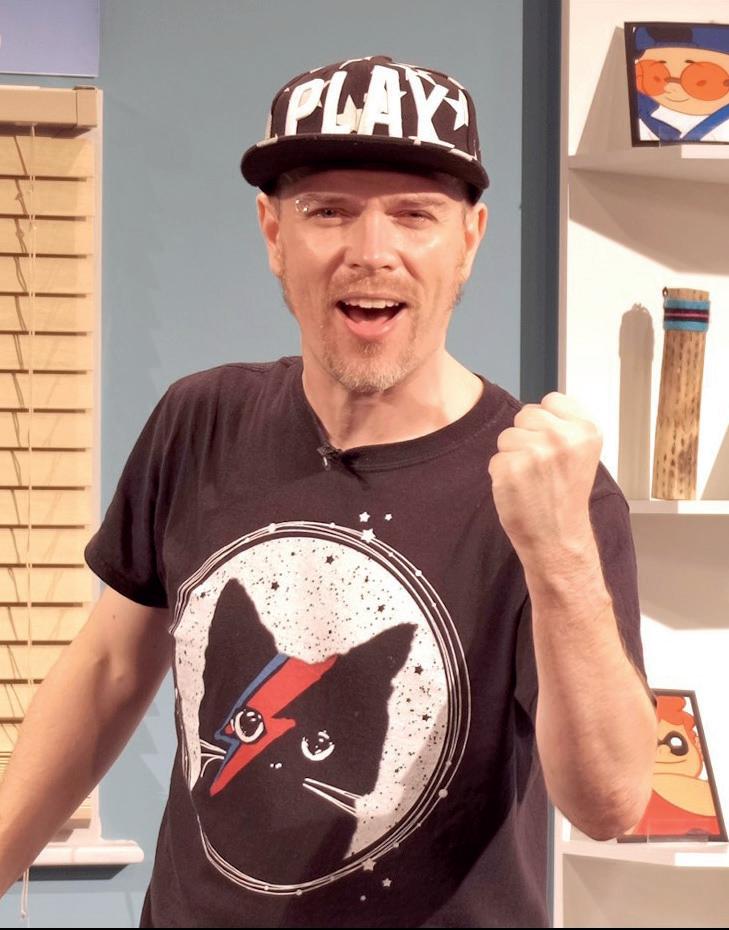
Drop-in author sessions. Multiple classes & schools working together.
Assemblies on Zoom.

Writers delivering Super Hero session content in a studio, recorded for schools to access at their convenience.
Super Heroes on the playground, socially distanced. Engaging parents and the wider school community.
“We were all put into a bit of a quandary really about how to do anything. With the use of technology, we’ve been able to overcome some huge challenges. It’s worked perfectly brilliantly, that online presence.”
The Summer of 2020 also brought with it the international #Blacklivesmatter movement.
Following on from the murder of George Floyd there was a lot of debate about the lack of diversity in children’s literature. Writing on the Wall was able to respond rapidly. It has a history of publishing original work and is connected to a wide network of writers.
As diversity became a more urgent priority for the Super Heroes project, the team quickly commissioned a diverse collection of writers to create children’s stories. The resulting anthology and resource-pack provided teachers with materials that went some way towards addressing the imbalance.
“I think the book is important because it showed us how unique and different we are from other people, and it’s not a crime if you’re different. It’s better if you’re different to everyone else.” –
The authors commissioned were: Ashleigh Nugent, Amina Atiq, Nathan Powell, Jon Mayhew, Alan Gibbons, Alex Swan, Katie and Kevin Tsang, Cheryl Martin, Helen Dring-Turner, Yvonne Battle-Felton, Emma Latham, Claire L. Heuchan, and Marie Basting. Illustrations were by Steven Matthews.
The stories were compiled into an illustrated anthology called Diverse Stories for a Diverse World and included a foreword by Mayor Joanne Anderson and an introduction by Darren Chetty. Every school was given copies of the anthology, along with teaching resources and filmed lesson content.


This initiative indicates the impact of Super Heroes as a partnership between arts organisation and schools. Writing on the Wall was able to offer support and resources promptly. As a result, teachers were better able to work with pupils to address issues that were affecting them more widely in society.
Super Heroes videos were filmed for use in the classroom and as the pandemic went on, sessions were delivered live via Zoom.
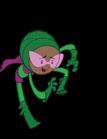
Teachers found the pre-recorded content and Zoom sessions helpful, although they missed writers being present in the classroom. Zoom did however allow Super Heroes to work with more than one class or school at the same time. Teachers said that linking up with other schools was successful and that they wanted more of it.
“It was going out across Liverpool; the children were able to share their ideas and hear from people they’ve never met before.”
The pivot towards online content opened up new opportunities for schools to connect. The sessions effectively piloted new and accessible ways to bring artists and creativity into the classroom. Pre-recorded videos were a sustainable approach and they continued to be available to schools into the final year of delivery. Their continued accessibility will be part of Super Heroes’ legacy.
“I think the success is the link up with other schools, that’s been really successful. That’s something I think we should do again.”

An anthology of nine poems from eight schools was published in 2021, titled Playground Poems.
“The children published their own book and that was amazing. There was a huge celebration of being a published author. Their shoulders rose up by an extra couple of inches.”
The Super Heroes project gave children the chance to meet and work with diverse writers. They were inspired by the adults they worked with and as a result, they became more comfortable writing about their own diverse experiences and interests. Children’s aspirations were raised as creative adults became role models.
In the gradual return to normality after the Coronavirus lockdowns, teachers began to notice that the pandemic had impacted on the mental health of children. In response, Super Heroes pivoted towards using writing to promote wellbeing.
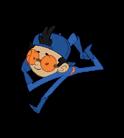
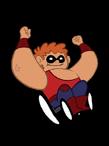
What follows expands on the outcomes of Super Heroes for children – strength and resilience, inspiration and role models, engagement and motivation, literacy, diversity and wellbeing.

Pupil




The Super Heroes theme helped children to start with their own strengths and experiences. Learning about how authors edit their writing, gave children more resilience to take feedback and rewrite. Their confidence grew and children overcame fear of the blank page.
90 % of teachers said children were inspired to write independently at home
90 % of teachers said children were more comfortable to share their work
“They’ve got that confidence: ‘I can give it a go’. Which is lovely to see that having the presence and hearing the stories of the poets and the Super Heroes we’ve worked with, and how they’ve got into it... it opens up the world.”
63 % of teachers said children were more willing to say when they needed help
“They felt comfortable sharing their work and writing freely.”
“Children learned that writing evolves and is not always perfect first time.”
“The author themself, as somebody who’s actually practising and successful in what they’re doing... it’s going through the: you try and fail, and you try again, and you keep going. Those kinds of attitudes to learning, that’s been really, really important”
“Now, because there’s been such a focus on ‘it’s what you write: your words, your power’, a lot of children are feeling a lot more confident, they’re not as put off by a blank page”
“Mistakes mean that you learn from them: that’s growth mindset. We’re hearing this from accomplished authors. That’s an outcome for our children.”
We knew our super heroes were going to be great, but we have been blown away by the incredible work that has been done over the lasT four years
We have seen children and teachers becoming more excited by creative writing, making work that has been out of this world!
from improvemenTs in confidence and writing ability, to meeting diverse arTisTs that have inspired writing both inside and out of the classroom
creative education has come out on top, placing its imporTance firmly inTo school life
Children were inspired by the writers they met. Authors were from different backgrounds, specialisms, cultures and heritage. This diversity of writers raised children’s aspirations, they began to understand that anyone can be a writer and there are no limiting factors.
In some instances, this experience has been transformative. Children have been seen to communicate thoughts and feelings in writing that they found hard to speak about out loud.
“Children were made to feel proud of their work.”
Engagement was high. Some teachers commented that the project was particularly effective in engaging boys who had been reluctant writers. Authors made being creative seem aspirational, and in particular the male authors showed the boys that there are other ways of being masculine. Boys started making comics and stories in their own time to bring into school. For girls, this was a different way of engaging with writing and they became confident to share their ideas and perform.
“It has been very powerful to see all these artists with difficulties sharing their stories.”
Working with other classes on Zoom had an unexpected benefit when children began to evaluate their work against other classes and other schools. This had a really motivating effect.
92% of teachers said children wanted to share their writing with others
89% of teachers said Super Heroes raised children’s aspirations
82% of teachers said children were more excited on Super Heroes days
“Many of our children had never met an author and this was inspirational for them. Some of our children have joined the out-of-school writing club and now aspire to become authors.”
Children were excited. Sometimes the sessions responded to current affairs, and this is when children were especially motivated. When refugee migrant families were arriving in Liverpool for example, classes in Super Heroes schools wrote letters to their children.

Relevant writing themes, writing for publication in the Super Heroes anthology and knowing that work would be shared with other schools on Zoom, gave children’s writing an exciting sense of purpose.
“The children are buzzing about it; they’re so enthused by the content and working with one another. The resources that support their writing are excellent.”
100% of teachers said children were present and active on Super Heroes days
100% of teachers said children contributed ideas in Super Heroes sessions
“The children published their own book and that was amazing. There was a huge celebration of being a published author. Their shoulders rose up by an extra couple of inches.”
“Some of our boys are quite reluctant to write, the Super Hero theme engaged them. When they came onto the playground, it got them interested in writing.”
“We’ve never seen children write like this before!”
“It gave our children a real platform for writing in such an enjoyable way”
“Lack of male staff representation in school makes it difficult for boys to engage. Male writers have a huge impact on children.”
“The children were more enthusiastic when learning with different professionals and real writing.”
“They were begging to show their work!!”
Super Heroes alone cannot make claims for a causal relationship with children’s progress and attainment. However, taken alongside other factors, some schools reported better test results for their Super Heroes children.
“71% of our children achieved the expected standard and 21% achieved greater depth, which we’ve never had. That was something to celebrate. For that cohort of children, having an opportunity to engage with Writing on the Wall and the Super Heroes project, that’s played a part.”
It is clear that creative education has an impact on literacy in schools. However, as it is difficult to quantify this within the overall school literacy programmes, the focus of the sessions reflected a review of our Theories of Change with Curious Minds, and so shifted from improving literacy to highlighting our experience and unique perspective at WoW, of using writing as a tool to inspire pupils to write, and to view writing as a positive and fun experience, support positive change, improve wellbeing and increase awareness and understanding of diversity. The feedback from observation forms, filled out by teachers after each session, was overwhelmingly positive and drew on pupil’s improved engagement with diverse characters and increased interest and confidence in writing.
Super Heroes aimed to encourage teachers to consider how aspects of school life can influence what children choose to write about. Through CPD, teachers were encouraged to think about representation in the literature that children read. Super Heroes created a space for teachers to talk about diversity in education.
In June 2020 Darren Chetty delivered training remotely by Zoom. A writer, teacher and researcher, Darren writes about Philosophy for Children, racism and multiculturalism. His session had a profound and lasting impact on teachers. Schools reflected, for example, by examining the books children read in school and auditing them for diversity and representation.
Children met a variety of writers from wide ranging backgrounds. As a result, in Super Heroes sessions children learned that they could use character names from their own culture or heritage. They understood that they could write characters who were like themselves or who were different.
Teachers described how, over time, their classes became incredibly proud to celebrate all of their differences, culture, heritage, special needs, and disability. It is clear that the writing produced drew on the children’s own lives and experiences.
“Children are making the main characters in their stories more like themselves. They are also including speech in their writing in their first language that is not English, or they have shared phrases in their first language with their friends.”
“The activities and workshops helped to grow an understanding of writing from a variety of cultures and diverse authors, poets and performers.”
“This aspect has been incredible for our school community, which is not very diverse at first glance.”
“To have heroes and main characters in books that they can relate to, that have the same accent, ethnicity, backgrounds and even hair just like theirs and their peers... We want to inspire our children to write exciting stories and for children with English as an additional language to use speech from their first language in their stories and to use their culture and traditions to inspire their characters.”
100% of teachers said children were given permission to write about their own experiences and share

100% of teachers said Diverse Stories for a Diverse World and other interventions changed children’s perceptions of characters in literature.
91% of teachers said Super Heroes helped children to better understand that their writing in school can include diverse characters and settings.
Children were very enthusiastic to meet writers whose stories they had read in Diverse Stories for a Diverse World. They engaged with them, listened to their stories and asked questions. Meeting different people with different perspectives had an impact, sometimes these were adults that the children could relate to more than the staff in school. One child, for example, was inspired by a writer in a headscarf because she was just like her mum.
“Some of our children have joined the school writing club and aspire to become authors. Our pupils were given the opportunity to work with a diverse range of visitors who developed their lifelong thinking. They have become much more confident and are more willing to express their opinions and ideas.”
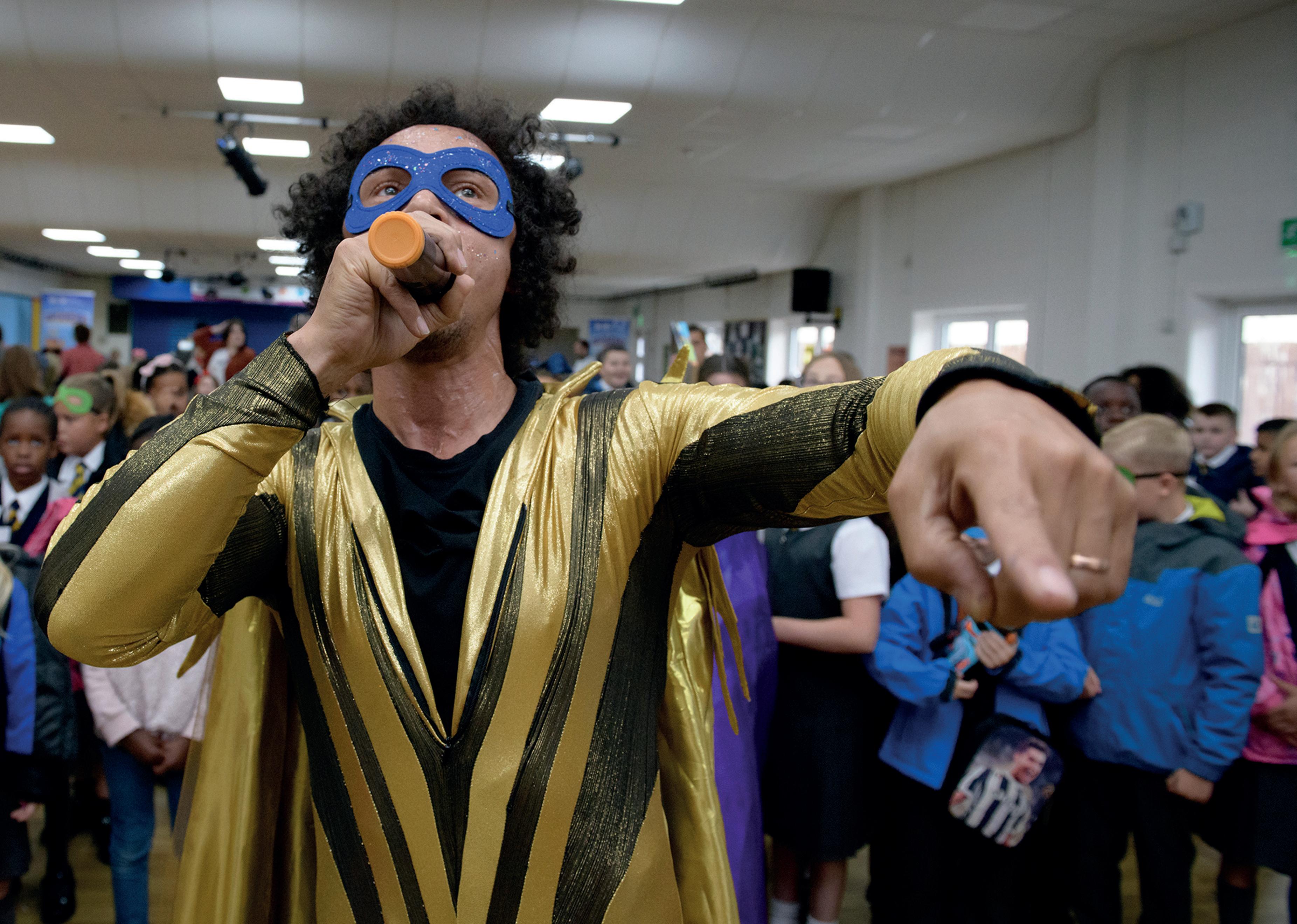
covid forced us all to spend a lot of time aparT, but it also gave us opporTunity to come together in ways we hadn’t before
as the Black lives mat Ter movemenT grew, our super hero schools wanTed to take acTion of their own
The sustained presence of Super Heroes in schools over three years had an impact that went beyond English lessons. Children became more confident and reflective learners, thoughtful when giving feedback on one another’s work. A growth mindset was reinforced as children overcame a fear of failure. When children saw that imagination could help with their thinking skills in other curriculum areas, they became more motivated.


Teachers considered diversity and not just in English, reading and writing. Super Heroes got them thinking representation across the curriculum.
72%
schools were looking for more diverse literature to take creative acTion, but were sTruggling to find any in the library, or anywhere else for that mat Ter!
of teachers said the impact was not limited to English, children were more likely to bring ideas based on their own interests across the curriculum.
“Having been exposed to a range of different genres in a creative way has helped them when creating and writing across the curriculum.”
“The impact has made children secure as learners.”

so, we began a new mission to create a new, represenTative, children’s book – super heroes: diverse stories for a diverse World


65% of teachers said children showed increased confidence in their other lessons too.
73% of teachers said children applied the skills they had learned in Super Heroes In other lessons too.


Covid had an impact on children’s mental health. Teachers explained that children were more anxious and felt less secure. Behaviours for learning, like listening, resilience and stamina, were all affected. Super Heroes responded, piloting a small-group project in 2021 that used writing for wellbeing. The project was called Mini Heroes.
Children taking part in Mini Heroes were asked about its impact. They said they were more happy day to day, felt better about their academic achievements, were more motivated for school and were enjoying school more. At the end of the programme there were improvements in children’s confidence to make new friendships and to answer questions in class. Some said coping with change was easier after Mini Heroes.
“After personal issues, the Mini Super Heroes has had a massive impact on my child’s social and emotional health, so thank you.”
In response to consultation with teachers, wellbeing became the focus of the Super Heroes programme in 2022. Schools were introduced to the therapeutic qualities of creative writing and techniques were modelled such as writing blasts and affirmations. In some classrooms this work was so effective that teachers have embedded this practice in their classroom routine.

“The impact on wellbeing made children secure as learners and reflective about their own qualities and strengths.”
Super Heroes gave schools the chance to examine diversity not just in English but across the curriculum. CPD from leading thinkers such as Darren Chetty, highlighted the importance of representation in children’s literature.

90% of teachers said there is greater diversity in children’s characters and writing.
100% of teachers said their school had been introduced to a greater diversity of writers.
“The diversity which was fed through the programme was great. The children’s eyes were really opened to many different authors, illustrators and characters of different backgrounds and abilities.”
From its inception, Super Heroes aimed to place creative learning and creative adults into primary classrooms in a sustained way. The aspiration was that over time the residency would make a lasting positive difference to the culture of creativity in each school.
“Teachers find it difficult to be creative within the curriculum. Having the opportunity to be creative and have freedom for children to write about what they want, outside of the curriculum, was so important.”
Schools were already committed to the Artsmark Award, so Super Heroes started from a strong base. Creative approaches and activities were modelled by visiting writers, in the classroom, on Zoom and in film. Throughout the project CPD sessions were developed for staff.
“Excellent writing strategies taught; I will definitely use these to teach creative writing.”
Super Heroes as a creative learning programme had a clear and convincing impact on the children. As a result, teachers were inspired to use creative approaches and embed work with professional arts organisations and writers in their planning.
“Artists delivering sessions acted as CPD. Watching experts deliver meant teachers often learnt new skills.”
“I have taken lots of things into my own teaching”
“Many children who are SEND really flourished in the lessons as the writing was more relaxed and there was more freedom to express.”
100% of teachers said sessions included games and drama
100% of teachers said they were inspired to be more playful as teachers
54% of teachers said the dynamic shifted in the classroom in relation to norms and expectations
“Children gained an understanding of why we write, that writing can be fun and for pleasure, can be personal and celebrated in different ways, and it can have an impact on others.”
Teachers said that Super Heroes supported them to address issues of mental health with their classes, modelling techniques they could adopt and adapt. Teachers were convinced by the therapeutic benefits of creative writing. After the project ended, some teachers were still regularly using the writing exercises with their class that they had learned from Super Heroes.
“It has brought mental health to the forefront of our minds – children have used writing more to help themselves.”
At the peak of the pandemic, lockdowns seemed the biggest obstacle to overcome. It was impossible to know that the return to normality in schools would be a protracted process.
“Children now bring their own notepads into school.”
“Every morning children come in and draw and write – it’s just the norm now. The children have changed the culture.”
Teachers were under enormous pressure. They had to teach online, or in a hybrid combination of online and face to face. Phrases like ‘catch up’, ‘recovery’ and ‘lost learning’ prevailed. Work to adapt Super Heroes to fit in and around school priorities required email communication and online meetings and challenged the energy of teachers and the project team alike.
Covid did have a dramatic impact. Online worked but could not completely replace Super Heroes having a physical presence in schools, in classrooms, in staff rooms, working alongside teachers regularly, over a long period.
The long-term nature of Super Heroes did, however, allow participants a deeper understanding of the features of successful partnerships between schools and arts organisations. Assumptions were challenged and the factors that help or hinder progress and impact were revealed. The following sections expand on this learning.
“They’ve done everything in their power to make it interesting. And they’ve included staff across the school, we’ve had training (and been included in) decision making about how they’re going to move forward.”
super heroes: Words are our power was going great, unTil…


Super Heroes aimed to carve a space in the school day when children could write freely, for pleasure. The English programme of study at Key Stage 2 however, requires children to know about spelling and grammar and to demonstrate this in their writing.


Super Heroes broke new ground in how writers, creative practitioners and arts organisations can work with teachers and children. The pandemic necessitated innovation. Writers and teachers were learning how to work together to teach on Zoom, rapidly evaluating and adjusting between sessions.
The supervillain no one expecTed came along – covid

This became a steep learning curve as writers and teachers debated how to introduce this kind of writing. The goal was for children to be as imaginative as they could and capture those ideas quickly without worrying about spelling and grammar.
But we didn’t let that sTop us on our mission to develop creative education
Teachers and writers had to work out how to frame this in a way that did not undermine messages that children were receiving across the wider English syllabus, but at the same time did not weigh children down with the technicalities of writing at the expense of their creativity.
“I couldn’t write something without scribbling ideas, so why do we expect children to get it right first time?”
“...it’s a very specific skillset and by doing it intensively, you can put into action what you’ve learned, and begin to develop exercises. Being on Zoom has been a new learning curve.”
“...our children are quite used to Zoom because we do our assemblies through it and everything else. So, it’s enabled staff to have more engagement, they’ve got more ownership of the project.”
We sTopped, we lisTened, and we came back sTronger with new projecTs and a brand new children’s book!
Teacher-training sessions with experts were more accessible online as they took less time out of the school day than the face-to-face alternative. Online sessions were recorded, so teachers could catch up with them or watch them again when convenient.
“We’ve been able to link into them so much quicker because we’re not having to cover people getting to and from venues, which would always have been a day for maybe an hour and a half of training. So, we’ve just been able to cover people so much more easily.”
Online CPD opened up new possibilities and Writing on the Wall was able to invite experts from across the UK to share their insights with Super Heroes teachers.
The navigation of a large project through the ever-shifting restrictions of a global pandemic was challenging for the team at Writing on the Wall and for teachers. The scale of the task (in a pandemic) required strong relationships and rapid communication for agile problem solving; more project management capacity spread across fewer schools.
Despite all of the challenges presented by the pandemic, the team were able to deliver the whole Super Heroes programme and add extra value with new approaches that were piloted and developed in response to the Covid 19 restrictions.
“They’ve really stepped up to the mark. There were times when it would have been great to have people in, but it wasn’t able to happen. You just have to think, how can we make this happen?”


o, what have we learned by bringing super heroes to schools?



We found out we can use our power both in person and online to bring creativity to everyone!
n ot jusT with children in classrooms, but teachers too
definitely! Whether it’s teacher training or creative workshops, we can work in lots of ways to keep growing our super hero squad!
Reflecting on the four years, teachers and leaders described the impact of Super Heroes in terms of the culture of creativity across school especially with regard to wellbeing and diversity.
Issues of representation came vividly to the fore during the international #Blacklivesmatter and Super Heroes made diversity a priority. This has made a lasting difference to the schools involved, encouraging them to think carefully about diversity across the curriculum.
As schools recovered from the global pandemic, newer and more urgent needs emerged, particularly around children’s mental health. Super Heroes responded and writers modelled how to harness the power of the written word for personal development and wellbeing, providing teachers with creative techniques and ideas they can use throughout their teaching.
Teachers and leaders reflected that a partnership with an arts organisation and the impact of creative adults visiting the classroom, go across and beyond curriculum subjects. They said that Super Heroes was ultimately so much more than an English intervention in that it addressed a range of PSHE1 objectives. Children became aware of themselves, others, identity and diversity, mental health and resilience.
“What Super Heroes has done, and I can see this in our staff, it has made us go back and look at other areas of the curriculum and ask, have we got diversity? Are we showing artists from different backgrounds? I’m starting to see that more in our planning, it’s got the staff thinking about that.”




What’s nexT for super eroes: Words are our
“We’ve really got to think about how we’re inclusive, but also how we promote inclusion and diversity. That’s something that’s stuck with me personally. And something we’re much more inclined to do now as a senior leadership. We’ve talked about it time and time again.”
“WoW have developed the ability, given the funding and support, to scale up their creative education model with a fully developed live and digital programme to increase the number of schools they can engage with. Given the success of the project and the stripping away of artistic and creative programmes from the curriculum, there is no doubt this could play a vital role in supporting schools to continue to inspire and engage pupils through creativity.” – Dr Steph Hawke, evaluator, Curious Minds
We’ve already discovered the power of diversity, wellbeing, and creative education – and there’s lots more work that can be done!
remem Ber, Words are our power, so let’s use our learning to conTinue sharing our creative super powers across primary schools in liverpool
let’s head back to hQ and sTarT spreading the word!
Every project faces challenges. WoW built that expectation into their planning. But no-one foresaw the global pandemic and the lockdowns that were experienced just as WoW started the major section of the project delivery in 2020.
When the pandemic hit, WoW and the schools faced unprecedented challenges. They could have temporarily closed their operations and furloughed staff. This wasn’t an option for schools. WoW understand that creativity often comes into its own during times of adversity. As a socially committed arts organisation they felt they had to stand with school staff and pupils and demonstrate how their work could offer support through the most difficult times. The WoW staff quickly mastered the technology for this new way of working and delivered the whole project, including new online resources for staff and pupils, with writers and artists appearing in pre-recorded videos or ‘live’ in classrooms, on Zoom. Through piloting new approaches to teaching and CPD, what emerged was a rapid advancement in what the sector now understands to be possible in terms of children’s access to art and creative learning.
The murder of George Floyd in America rightly sparked a global movement against racism, with Black Lives Matter marches in every major city. This had a major impact upon staff and pupils and opened a discussion about the lack of diversity in literature for young people. WoW responded by organising CPD for staff with leading writer, activist and educator Darren Chetty, providing a safe space where they could explore the issues and discuss how best they could address them within schools. They followed this up by commissioning work from a series of acclaimed writers and poets and published a new anthology, Diverse Stories for a Diverse World, which they made directly available to schools – with a quality and speed matched by no other publisher within the UK. Post Lockdown, through sessions focussing on smaller groups, WoW addressed the impact
of the pandemic on the mental health and wellbeing of pupils. Their ability to continue to deliver the project throughout all these challenges is a clear demonstration of how an arts organisation can respond and pivot to address often unforeseen issues and offer everyone, in this case young people, a way to express themselves through creativity.
Managing a project in this context took Writing on the Wall on a journey. In the first lockdown, the project team (and teachers) were in the state of crisis-management, reacting to the shock of the pandemic. But through cycles of planning and replanning in response to the shifting context, the WoW team honed its skills. Flexibility and problem-solving as competencies were consolidated. As a result, agility and creative innovation are now Writing on the Wall’s hallmark traits. The whole process has given them the knowledge and skills to work alongside and within schools and the education system, while maintaining an independence to be able to offer a new perspective, new networks, new artists and constant inspiration.
Although there is a lot of individual examples and anecdotal evidence and feedback from teachers, it became clear that it is difficult for one project, even one as extensive as Super Heroes: Words are Our Power, to evaluate its impact upon overall literacy within schools. However, this does not negate the impact of the creative activities, the engagement with professional writers and artists, and the creative process in general. This key learning point freed up Writing on the Wall to use their creative approach to supplement the work of the curriculum by giving it the added value that creativity offers. WoW were also able to bring their own learning into schools around the importance of diversity, showing how children could, and should, see themselves in literature and art, and how this can inspire a new generation of writers and artists.
The success and impact of the model created by WoW, with Super Heroes at the forefront, has been proven. WoW have developed the ability, given the funding and support, to scale up their creative education model with a fully developed live and digital programme to increase the number of schools they can engage with. Given the success of the project and the stripping away of artistic and creative programmes from the curriculum, there is no doubt this could play a vital role in supporting schools to continue to inspire and engage pupils through creativity.

We would like to say congratulations and thank you all the Writing on the Wall staff who have led, worked on or contributed to this project, the many writers and artists who have been such an inspiration throughout, the volunteers and emerging writers who have supported us, and most of all the schools, their staff and of course the pupils who have taken part over the past four years. It’s been our pleasure to work with you and we are truly grateful to you all for the work you have put in and the amazing creativity you have shown throughout.
Special thanks to:
Emma Hulme
Alice Bunker-Whitney
Ailis Lord
Becky Downing
Helen Jeffery
Banks Road County Primary School
Blackmoor Park Junior School
Broad Square Primary School
Holy Cross Catholic Primary School
Leamington Community Primary School
St Michael and All Angels Catholic Primary School
St Cleopas CofE Primary School
Springwood Heath Primary School
Curious Minds
We would also like to put on record our appreciation of the generous support and funding we received from The Paul Hamlyn Foundation, with particular thanks to our Relationship Manager Noelle Gilbert for their ongoing support and guidance throughout the project.


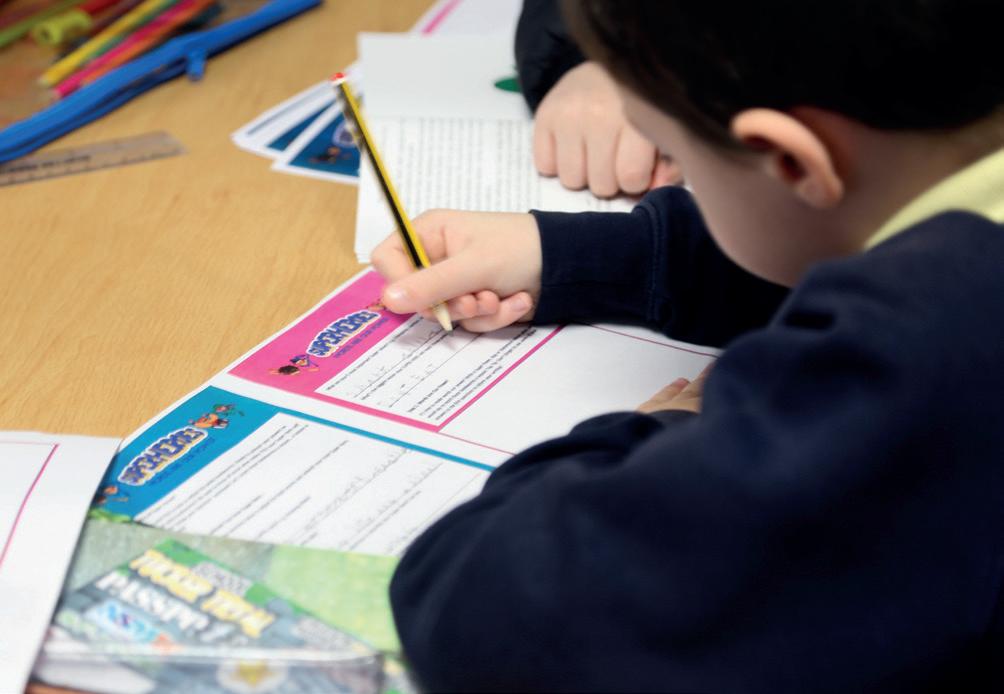
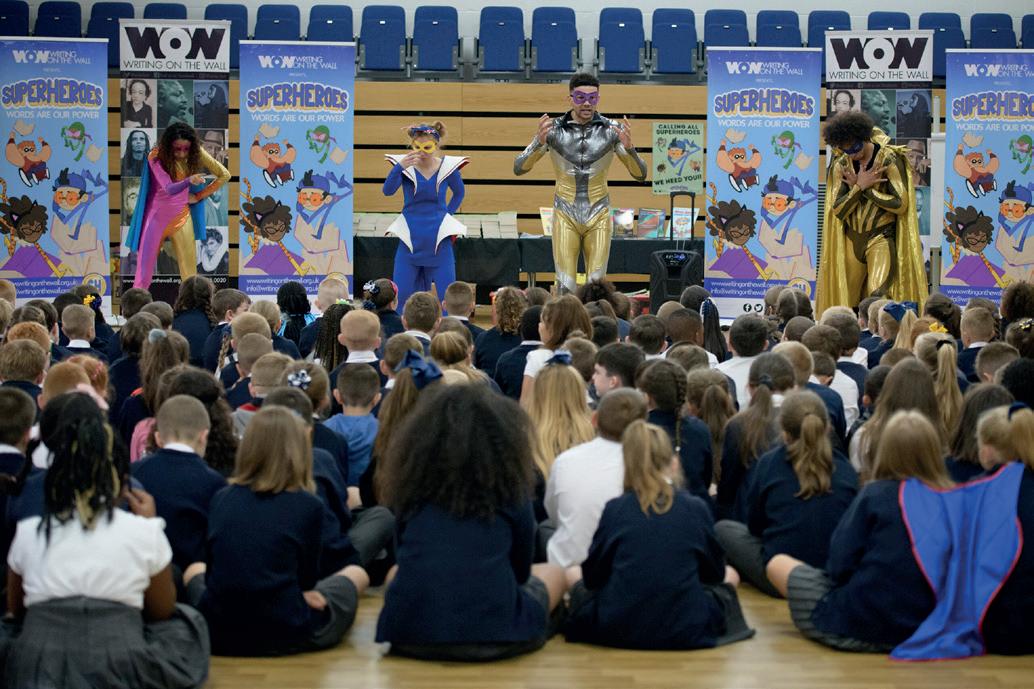
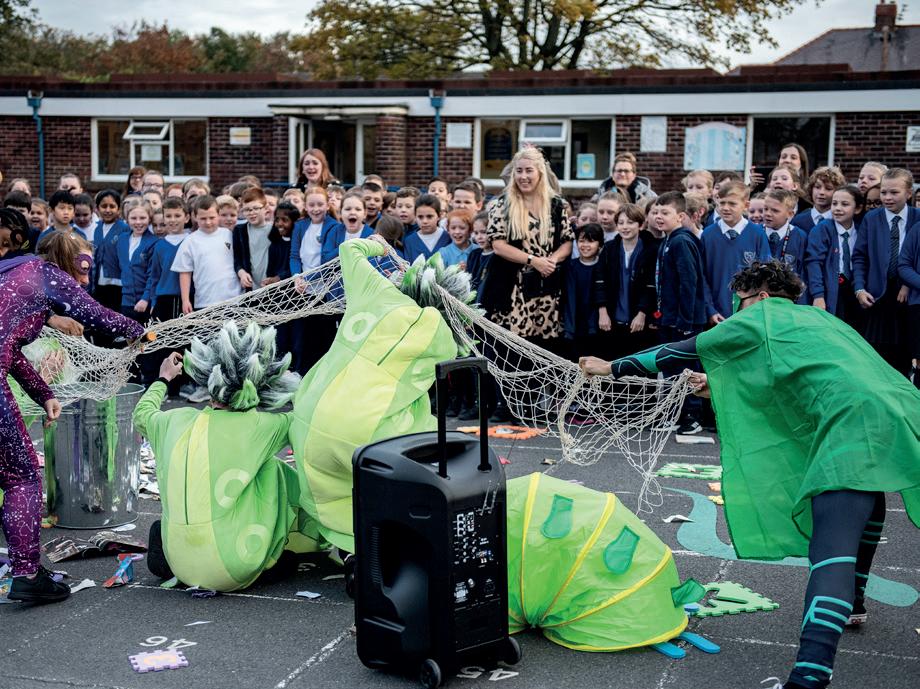


writingonthewall.org.uk
